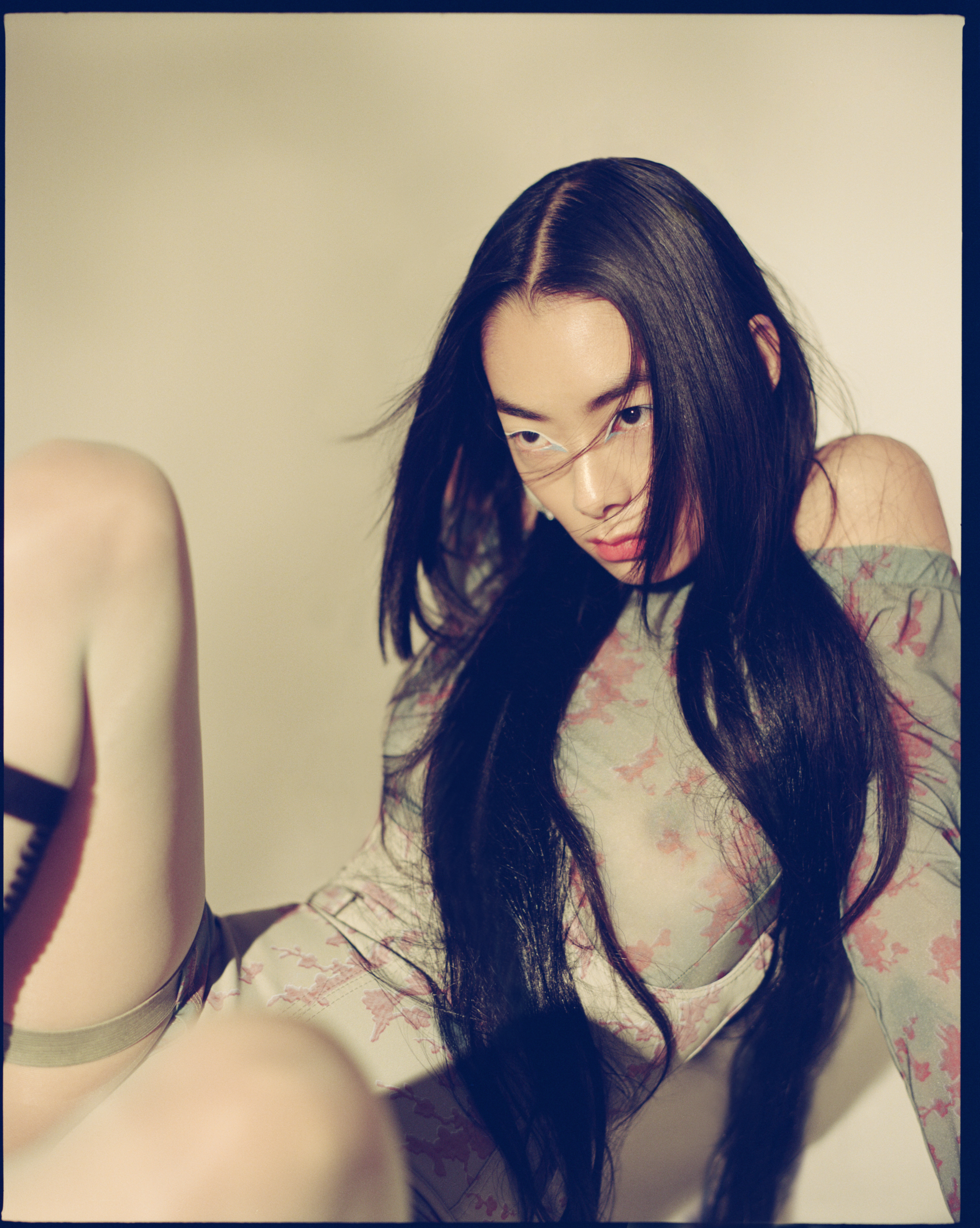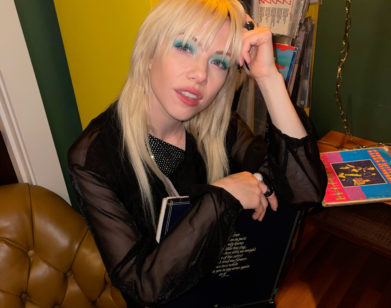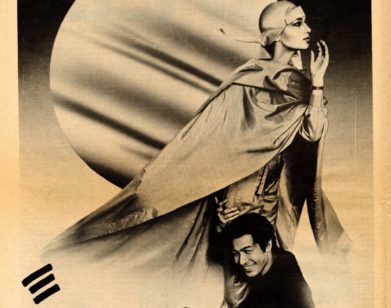Rina Sawayama Finds Her Chosen Family

Photo by Hendrik Schneider.
Rina Sawayama is ready for world domination. Born in Japan and raised in England by her immigrant mother, Sawayama’s future didn’t always seem star-studded. Coming from a working-class background, she says she “couldn’t afford” to make music, and “didn’t have the connections.” But somewhere in between getting a politics degree at Cambridge and launching her modeling career, during which she starred in campaigns for Versace, Sawayama found a way to start making her first EP, RINA. RINA, with its dynamic production and nostalgic 2000s Britney Spears references, instantly garnered Sawayama a cult following. Three years later, she is finally coming out with her first studio album, SAWAYAMA. Everything is different now. Sawayama went from funding all her own projects to getting some of the best support the industry has to offer, working with cutting-edge producers like the elusive Clarence Clarity and the avant-pop wunderkind Danny L Harle, as well as songwriters for Spears and Carly Rae Jepsen. The work and support that has gone into the album has clearly paid off. SAWAYAMA is incredibly agile, flitting from emo-pop to R&B in the span of a song without ever sounding muddy. Despite the glitzy sheen of her music, Sawayama says it took a lot of emotional work to make the album happen.
SAWAYAMA is all about family. “Dynasty” opens up the album, nearly operatic, as she sings about her inherited pain. We move through the rest of the album, which is full of potential chart-toppers, as the narrative sneaks up in songs like “Akasaka Sad” with it’s brutally honest lyrics (‘Cause I’m a sucker, sucker, so I suffer…Just like my mother!) If RINA focused on the loneliness inherent to the social media age, SAWAYAMA is about the loneliness that can crop up with the people we’re closest to, the rage that can set in when you’re constantly stereotyped, never seen as a complete person. But by the end of the album, Sawayama’s climactic ballad “Chosen Family” assures us that despite her struggles, she’s found her place in the world with the people she loves the most.
———
SHANTI ESCALANTE: I bet you’re in a kind of excited state with the release coming soon.
RINA SAWAYAMA: I am. I haven’t been able to sleep properly. I feel really lucky that I’ve got something to look forward to in this time.
ESCALANTE: It must be frustrating not knowing when you’re going to be touring.
SAWAYAMA: I mean, we have rescheduled, but who knows really. I just know that the live industry is really suffering right now. Live agents are having to reschedule everything whilst dealing with absolutely no income. I was meant to go out a week after the album dropped, which is kind of surreal thinking about it now, because I’m in a state of complete potato and I can’t imagine getting up and doing stuff.
ESCALANTE: What have you been doing in quarantine?
SAWAYAMA: I’ve been playing a lot of computer games. I upgraded my studio. I mean, I’ve kind of flat out refused to write any new songs until my album’s out. Lots of Animal Crossing.
ESCALANTE: How did you go from studying politics and modeling to making music? Was that transition difficult to make happen, or did it kind of just happen on its own?
SAWAYAMA: To be completely honest with you, I was doing music way before both of those things. It’s just that music didn’t make any money. I was just like, “How do you turn this into a career? I have no connections. My parents have no idea. They don’t have any connections either.”
It was a huge uphill climb. I was doing music at school, but all my friends went to another [high] school that I didn’t get into. I remember feeling such a lack of purpose and I didn’t have any friends to hang out with. So at that time, Oxbridge [Cambridge and Oxford University] came and spoke to our school because we’re a state school and we didn’t have enough people from the state education system going to places at Oxbridge.
It just lit a fire under me. I was like, “Right, this is it. This is what I’m going to do. I’m going to apply to Cambridge,” which is an insane idea because my GCSE just was not good enough. At the same time, my parents were going through a really horrible divorce. I think the work that it took to get in was a real good distraction. And I just really fell in love with psychology, politics, and sociology. Then modeling was after uni. Luckily a friend of a friend was signed at this new agency called Anti Agency and I got to do some amazing campaigns with Samsung and other brands. But music was always something I was aiming for.
ESCALANTE: Were you only singing at first, or were you playing an instrument too?
SAWAYAMA: I was always singing, but I’m kind of notoriously quite bad at keeping up with instruments. I once played the flute until grade three or something, but gave up. Yeah, it’s always been singing. I’m quite bad at practicing and stuff like that.
ESCALANTE: I imagine that studying sociology and politics is what gave you your anticapitalist edge, especially for RINA.
SAWAYAMA: I grew up liberal, but when I went to Cambridge it made me more liberal because you see the future powerhouses of the country—the future Boris Johnsons who’re these people in their drinking societies who’re burning five-pound notes in front of homeless people and doing horrible shit. Once you see that at age 20, your world’s changed, I think.
ESCALANTE: When did you start collaborating with Clarence Clarity?
SAWAYAMA: That must’ve been like four years ago or something. It was the year before I released my EP and the first song we wrote together was Alterlife. I ghosted him because I just didn’t like it. I wanted it to sound like game design and soundscapes. He nailed it, but I think I just wasn’t ready. Then I did a couple of other sessions with other people and then I was like, “Oh my god, this is actually really good.” Since then, he’s been my righthand man. We’ve been working on writing most of this record together. He’s the objective ear.
ESCALANTE: Your pop definitely has an edge to it. Have you drawn from the avant-pop movement in England, the PC Music era stuff? I know you’re now working with Danny L Harle [who is signed to PC Music] for your song “Chosen Family.”
SAWAYAMA: To be honest, I don’t think I’ve been inspired by a PC Music at all. Actually, me and Danny were going to write together way, way, way back when PC Music was blowing up, and it just kind of wasn’t my style. I really remember consciously thinking that if I did that sort of music, then I would be stereotyped. I would sound like a Japanese game girl and that’s not what I want to be. If I put a green wig on, it looks cosplay. It doesn’t look like when Gaga wears a green wig. That’s just something that I was very aware of from the beginning. But working with Danny on “Chosen Family” was something that we both enjoyed because we’re people who love pure pop. We were kind of craving to write something that was very much quite stripped down, but we put our little quirks into it, like the horses galloping and the guitar solo.
ESCALANTE: You went from being unsigned to signed, self funding to having financial backing. What’s that transition been like?
SAWAYAMA: Absolutely awesome. I hate asking for money so it’s been sick just not being like, “Let’s do a music video,” and then great, we’ve got budget already. Trying to do a music video independently is such a ball ache. Trying to do a tour with self funding is insane.
Signing to Dirty Hit was amazing. They have never pushed the commercial aspects on me. They basically didn’t change anything on the record, they just gave me the resources to take the sounds to the next level. Adam Hann from The 1975 is playing guitar in “Dynasty” and “Who’s Going to Save You Now,” which is insane. I was also working with the producers of 1975. I don’t think I would have ever got him to do that if I wasn’t with Dirty Hit. I wanted to stay independent because I wanted to stay true to what the music needed, and they’re all about that too.
ESCALANTE: I’m glad you found a home there. You mentioned in one of your Rina TV episodes that you were about to sign with another label and then “STFU!” came out and they were like, “Well actually never mind.”
SAWAYAMA: Yeah.
ESCALANTE: Was it difficult finding representation at first?
SAWAYAMA: It was difficult finding the right representation for sure. I think that’s something that artists should spend a lot of time because you’re stuck with them for three albums or five albums or however long your record deal is. The label that I was talking about dropped negotiations pretty late on which left me with an insanely huge legal bill. It obviously pissed me off because I think that’s completely unfair for them to do. They can afford to pay it and that happens all the time to artists. I’m mad about it, but I’m glad because it led me to finding the right deal in the end.
ESCALANTE: A lot of people have noticed Britney Spears’s influence on your work. I saw that for SAWAYAMA, you worked with Nicole Morier, who was also writing for Britney back in the day. What was that like?
SAWAYAMA: Oh my god, so insane. First of all, she’s absolutely lovely. She wrote two songs on the record, “Comme des Garçons” and “Love Me 4 Me” with me and Bram Inscore, who’s also amazing. Completely surreal. “XS” was written with Kyle Shearer. He’s written a lot with Carly Rae Jepsen and produced a lot for her and Carly’s one of my faves. I referenced Carly in “Bad Friends” so it’s just … It’s fucked up. I’m constantly battling imposter syndrome because I’m just like, “I don’t understand how you want to work with me. What’s happening?”
ESCALANTE: You have these early 2000s pop influences. Do you want your listeners to feel nostalgia? How are you leveraging nostalgia for your own music?
SAWAYAMA: I definitely want people to feel nostalgic. Maybe it’s just hindsight, but I just feel like chart music back then was crazy diverse. There was obviously a huge thing of R&B that was going on. Then rock like No Doubt and then Limp Bizkit being number one for weeks in the UK. I remember that Evanescence was number one for weeks. Avril Lavigne, all these random people and then it was R&B and there was Justin Timberlake, Pharrell and Beyoncé and stuff. I just hope that people don’t feel like it’s being too referential. That’s something I always want to try and stay away from. I always want to add something a bit new to the equation. Music from the 2000s was also the soundtrack to all this drama that I’m talking about the lyrics. I really wanted this record to sound like it was housed in the time when the things I’m talking about were happening.
ESCALANTE: SAWAYAMA feels centered on loneliness, which is a theme you’ve worked on before. But now it feels a little closer to home, the loneliness that you can feel with the people closest to you. What sparked that focus?
SAWAYAMA: I think the best songwriters are like therapists. I have quite an interesting past, I guess. I didn’t realize the significance of all this family drama–my mom being an immigrant and single parent, and then going to somewhere like Cambridge that has its own weird struggles with racism, sexism, all that. It took being in the studio with people who you can really trust with your thoughts and your ideas and your lyrics to bring it out of me.
It’s been three years since RINA came out and things have definitely changed on a personal level. I’m at a place where I can talk to my family about things that have happened in the past. That’s been a really amazing, healing thing. The ultimate thing is that my mom was proud of it and she loved it. She’s the one who finishes the whole album. She’s the one talking at the end of “Snakeskin.”
ESCALANTE: I feel like there is this kind of an inherent loneliness to being first-gen, which I also am, since you never really feel like you belong to either your own country or to your parents’ country. Were you speaking to that experience?
SAWAYAMA: For sure. I’m sure you can sympathize with this—that with age it does get better, knowing where you want to stand between those spaces. You can be super Japanese in one place and then super white in another. You can put different hats on and that’s kind of an advantage, I think. Before, it used to be a disadvantage. It was like, “I don’t belong anywhere,” but now I’m kind of like, “Oh sweet. I have two places I can call home and not that I fully fit into either, but that’s okay. I get to enjoy both. I speak two languages.”
Previously it was like, “My mom speaks such bad English. That’s so embarrassing,” and all these things that would cause me so much anxiety when I was a teenager. I hope that the album speaks to people who are in the same situation as me and I hope that the fact that I’ve kind of dramatized it and therefore slightly satirized it makes people feel like there’s the light at the end of the tunnel. Satire has been such an amazing force in healing everything, whether it’s me and my chosen family taking the piss out of our families because they’re so ridiculous or me and my mom laughing about what she used to do.
ESCALANTE: Also, as we age, our parents age. To be an immigrant raising a child, those first years are incredibly difficult, but as you grow up, they’re also going through their own process of coming into belonging.
SAWAYAMA: Yeah. There’s just this kind of sadness about your parents getting older, and I think there’s some really important conversations to be had with them no matter how uncomfortable it is. Recently me and my mom kind of started talking about bisexuality. I’ve got this thing coming out basically that opened up the conversation between her and I and that was really interesting because in Asian households you don’t really talk about sexuality—full stop, sex or anything. So that was very healing for sure.
ESCALANTE: Where have you found your chosen family?
SAWAYAMA: Luckily, all over the world. I feel like I have best friends in LA and Japan and the UK and half of them I met online, like Chester Lockhart and Hana and Dorian. We were just fans of each other and we met online and now we’re just inseparable best friends. I think that’s kind of the power of being online—to sort of cut those borders and just talk to people and become friends with them. I know that a lot of my fans become friends online, and that’s amazing.






